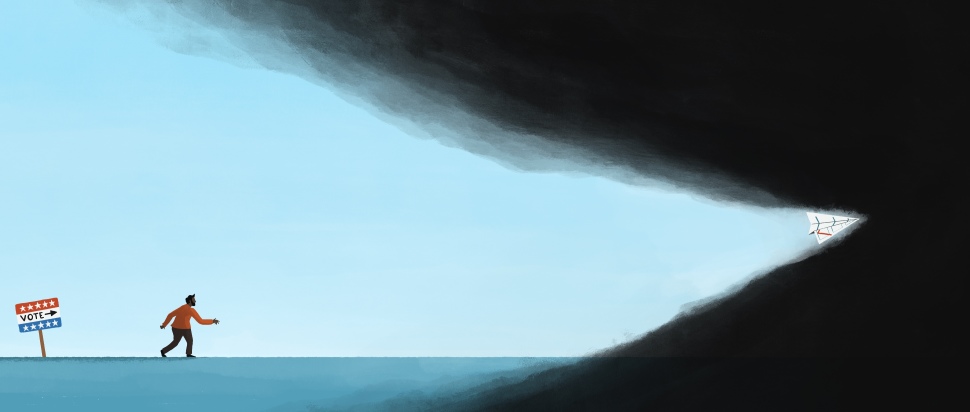Watching the US election as an American abroad
The US presidential election takes place this week; one American living in Scotland reflects on experiencing it from across the pond
The clock reads 4am when my husband nudges me awake. The window of our bedroom is opaque from autumnal condensation. But the lights of the red double decker passing by still shine through. Full of those returning from late night shifts or those just starting their early workday.
“What?” I ask him.
“She lost,” he tells me.
It is 9 November 2016, and he had spent all night glued to the television watching the US election results. I go back to bed but will wake up later to speak with friends and family. I will read the news, scroll through Twitter and cry twice, helplessly muttering “I’m with her.” Dread will soon surround me, and I will spend days trying to make sense of how we got here: Donald Trump as President.
Fast-forward four years and I am now sitting in my tenement flat in Edinburgh. I am, like you, trying to survive a global pandemic both mentally and physically. On top of that, I am facing another US election cycle in which the incumbent will go head-to-head with Joe Biden. By the time this is published, I will have sent off my early voting ballot. But I won’t know who the next US President is. Lately, life is about operating in a vacuum of not knowing what will happen next.
Every Sunday afternoon, I call my family in the US. We bridge the thousands of miles and six-hour time difference via FaceTime. I update them on my work, husband, and latest writing projects. My little brother shares stories about middle school, his latest athletic endeavours, and then wanders back to his room to play Fortnite, leaving my parents and I to talk life. In 2020, those 'life talks' have shifted more and more into politics.
Conversations with my parents during lockdown have felt revolutionary. We have broached many difficult and challenging subjects based on world events: indefinite lockdowns, an election year, politicians’ mishandling of COVID-19 and the systemic oppression of Black people in the US and elsewhere across the globe.
Underlying all of this is an understanding that change needs to happen and, for us, that partly begins with voting day this November. Some of my friends will choose not to vote in this election. Some will argue that current structures need to be completely dismantled so we can start from ground zero. But for my immigrant family, voting is one of the few acts that allow us to feel equitable in American society.
My parents are the daughter and son of Mexican immigrants who came to the United States in the early 1960s from the north and south of Mexico, respectively. We are a family of grafters, dreamers, and makers. All my life, my family has instilled in me a firm belief that it is my human right to migrate, to travel, to make home where I can best contribute, flourish, and benefit those around me.
Spending my late twenties and early thirties in Scotland has allowed me to gain a deeper understanding of self, of my values and beliefs. Through my work with The Scottish BAME Writers Network, I have learned how to marry my love of writing with my passion for community activism. In doing this work, I have learned of many other brilliant people in Scotland doing powerful work to better the lives of young Black and People of Colour Scots, those welcoming refugees, and providing practical support for asylum seekers.
I felt very lost during the last US election. My husband and I had just emigrated back to the UK after two years living in Ireland. We were navigating a complicated immigration system, I was unemployed and, like many others, we both were processing the reality that the UK voted to leave the European Union. We left our Irish friends not knowing what the future relationship would be between the EU and UK. My heart hurt knowing that freedom of movement was ending after what it afforded me and my husband so early in our marriage.
Even now, there are many times when I feel completely powerless and at a loss. It is easy to be jaded by politics. But I understand that to change the system we must challenge the idea that as individuals we have nothing to contribute. My FaceTime calls this year with family and friends have demonstrated the power of conversation. Open dialogue allows us to reflect on what is happening around us.
Voting alone won’t change everything. Often, the most important changes come in the form of community activism, mutual aid, local government and grassroots organising. In Scotland, I have met numerous people fighting to create equitable opportunities for their communities. These people continue to inspire me during a time of such uncertainty. I may not know the outcome of the US elections, but I know that I have so much to contribute to my local communities and that provides me with some sense of hope.
Illustration by Andy Carter
